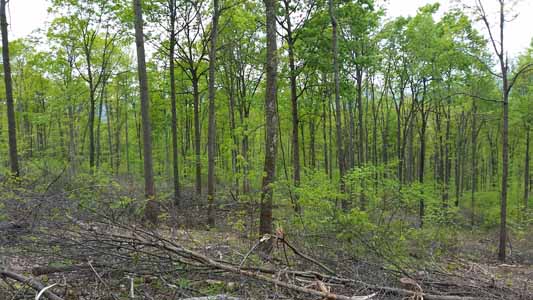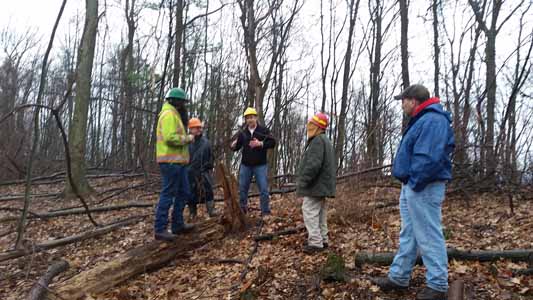Private landowners are vital stewards of our nation’s landscapes and wildlife. Roughly 60% of land in the United States is privately owned. In many cases private lands are working lands that provide critical resources – such as food and wood – as well as a source of income and livelihood to landowners through farming, forest management, and other agricultural and recreational uses. They also provide important habitat for a variety of wildlife and are an integral part of a healthy ecosystem. Working lands can operate sustainably in ways that provide critical wildlife habitat while maintaining, and even enhancing, the land’s productivity and value.
Though significant areas of the Appalachians remain forested, forests today are very different from those that existed prior to the 19th century. Present-day forests are often very uniform in age and structure. Forests with densely packed trees and closed canopies lack the variety of overstory and understory habitat structure required by many songbirds, such as the Cerulean Warbler, and other wildlife. Disrupted or absent natural disturbances, such as forest fires, has led to a lack of young forest habitat on the landscape, which is vital for the survival of imperiled species like golden-winged warbler. Together, these threats have dramatically impacted forest health and reduced the quality of these forests for timber value and as wildlife habitat.
Sustainable forest management is a tool landowners can use to combat these threats. Active management such as controlling competing and invasive plants, thinning undesirable tree species, and forest stand improvement can promote the mix of cover and tree species needed for wildlife to thrive. Removing undesirable plants improves forest health by providing more sunlight, water, and nutrients to more desirable species. The increased food and cover means better wildlife habitat.
Sustainable habitat management can provide landowners with economic and ecological benefits including:
The Appalachian Mountains Joint Venture (AMJV) is working with partners to provide a variety of opportunities for private landowners in improving habitat on their property to benefit a variety of birds and other wildlife, including game species and even pollinators. Technical and financial assistance is available to help landowners interested in enhancing wildlife habitat on their land. To learn more about managing your woods for wildlife, visit our Creating Wildlife Habitat page.

Five reasons why having a forest management plan is one of the most important things you can do for your woodlot.
Read More
How working with a professional forester can help you manage your land to meet your goals.
Read More© 2018 appalachian mountains joint venture 1900 Kraft Drive Suite 250 Blacksburg, VA 24061 Office: (540) 231-9519
Website by Skyhound Internet Funded by: AMJV Partners
Appalachian Mountains Joint Venture
1700 Kraft Drive, Suite 1375
Blacksburg, VA 24060
Office: (540) 951-9376
© 2019 Appalachian Mountains Joint Venture Funded by: AMJV Partners Website by Skyhound Internet
